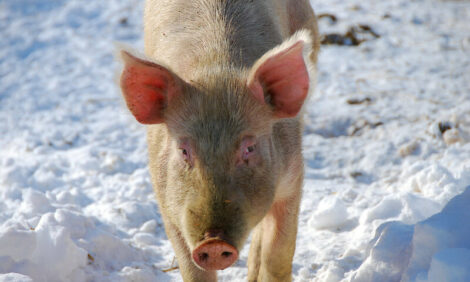



PIG & POULTRY FAIR: BPEX Optimistic about the UK Pig Industry
UK - Despite continuing high feed prices, the prospects for the UK pig industry are definitely improving, according to BPEX Director, Mick Sloyan, speaking at a press conference at the British Pig & Poultry Fair this week. Senior editor, Jackie Linden, reports.Welcoming the chance to report some good news, Mr Sloyan opened his presentation at the British Pig & Poultry Fair this week saying that the DAPP had been on the rise over the last few months – at last – and now stands at a little over 148p per kilo.
On the other hand, feed ingredient prices remain stubbornly high, he said, and the challenge now is to improve the competitiveness of the industry, where some progress is already being achieved. For example, investment to improve profitability was up in 2011 and more pigs were slaughtered than in any year since 2002.
To encourage producers in the months ahead, BPEX will continue its Two-Tonne Sow (2TS) programme and is introducing a new challenge to finishers for best performance in a project co-sponsored with Elanco.

On herd health, Mr Sloyan said that disease challenges constrain production and that BPEX has developed some new initiatives to help.
One of these is a new DVD, giving advice on best practice for producers.
The Pig Health Improvement Programme (PHIP), begun as pilot programmes in Yorkshire and East Anglia, is now being rolled out nationally and is generating much interest among producers, according to Mr Sloyan. The programme aims to get groups of local producers to come together to discuss the pig health issues in their area and set priorities for the reduction or even eradication of disease challenges from their locality. On food safety, he highlighted BPEX's efforts to help reduce Salmonella scores as part of the national Salmonella reduction programme.
On welfare issues, the BPEX Real Welfare programme is being rolled out across the industry this year, aiming to shift debate away from particular production systems and towards to welfare outcomes for the animals. Assessors are being trained to visit farms to help producers identify which areas, if any, would benefit from more attention.
Maximising value has been a theme for BPEX in terms of pig meat promotion, said Mr Sloyan. In the UK, pork is well placed on price in a market impacted by difficult economic conditions. To grow export volumes, opportunities are being sought inside and outside the EU for value-added products from those carcass parts less popular at home. Mr Sloyan gave the example of pig ears in China achieving twice the price as pork chops. Agriculture Minister, Jim Paice and BPEX Chairman, Stewart Houston, were at that time on their way to China on a trade mission to boost pig trade with the country. (For more information on this story, click here.)
Turning his attention to the EU welfare directive including the partial stall ban, Mr Sloyan highlighted the recent success achieved by BPEX, Defra and the UK’s National Pig Association in reaching compromises with the EU authority over floor slot width and the definition of ‘unobstructed area’ for breeding pigs. (For more information on this story, click here.)
At the Pig & Poultry Fair, BPEX has launched a new web site, Countdown to 1-1-13, which brings together relevant information on about the new welfare directive, including levels of compliance in EU other Member States and the likely market implications.
Finally, a new DVD aimed at the general public was launched at the British Pig & Poultry Fair. It offers an introduction to the whole pig industry and showcases how good the British industry is, said Mr Sloyan.








